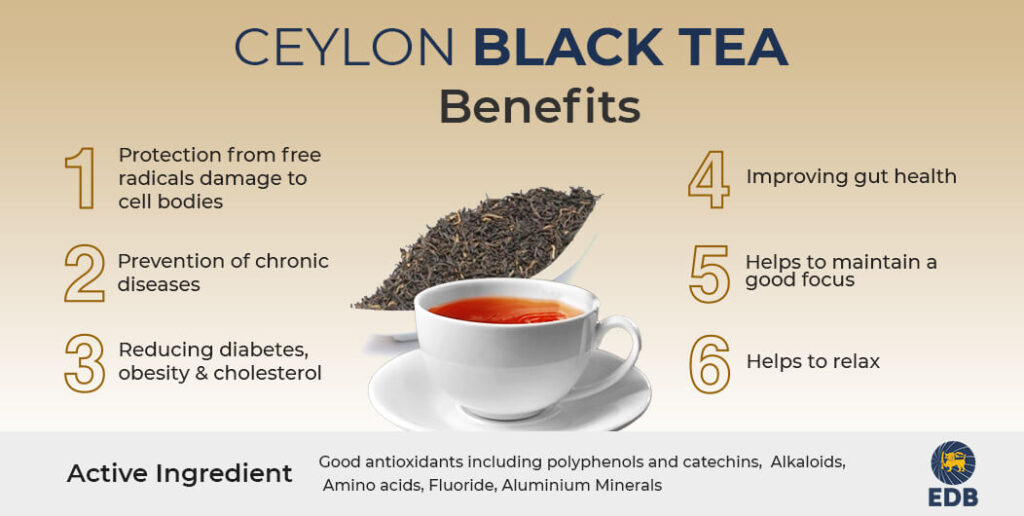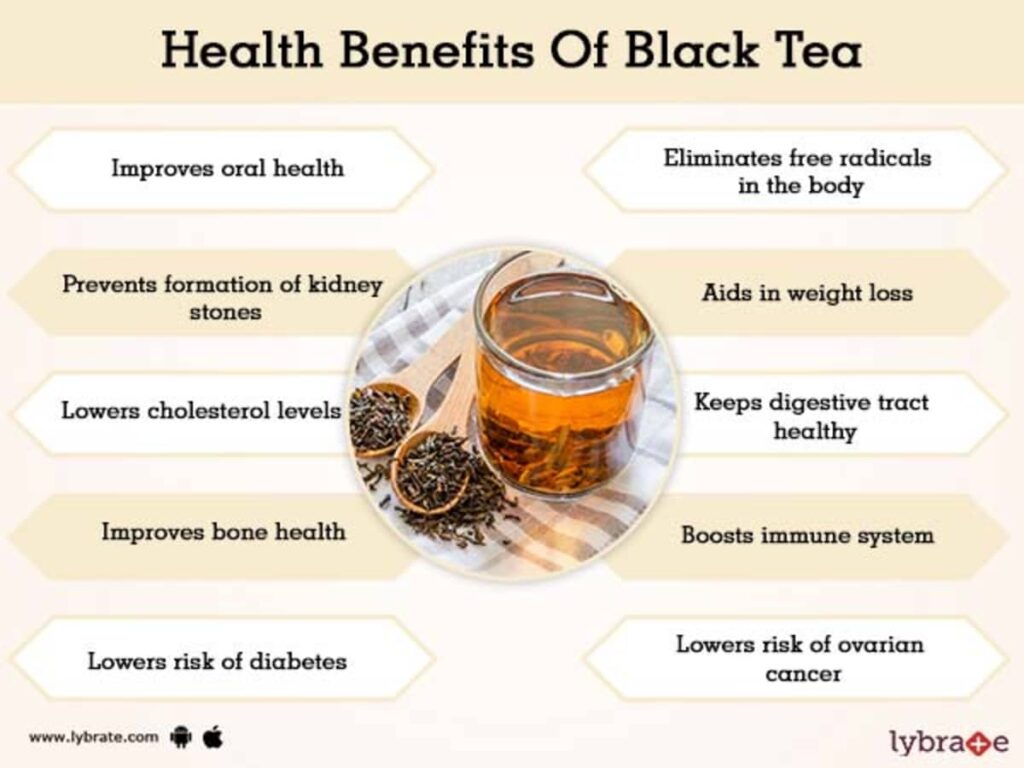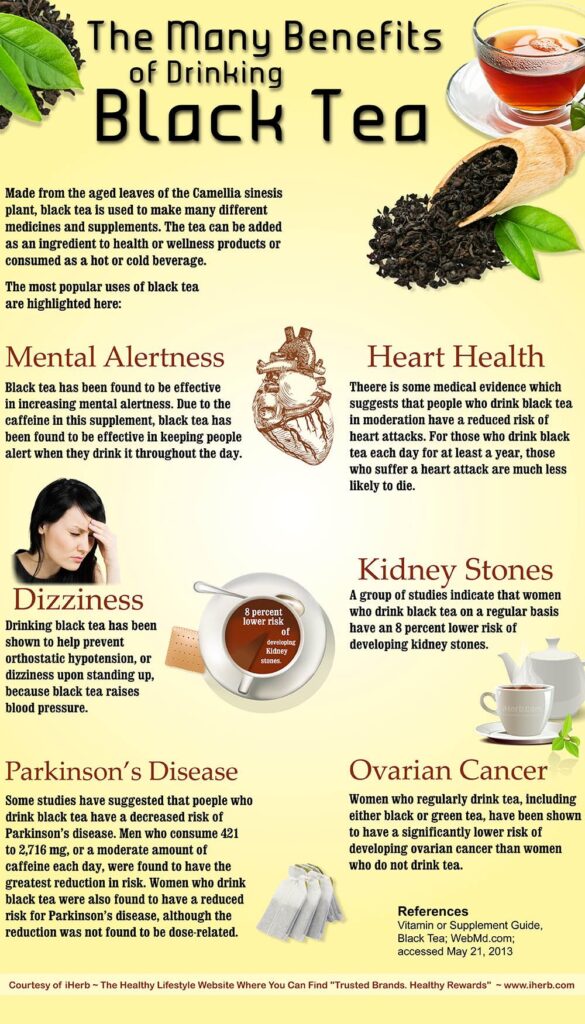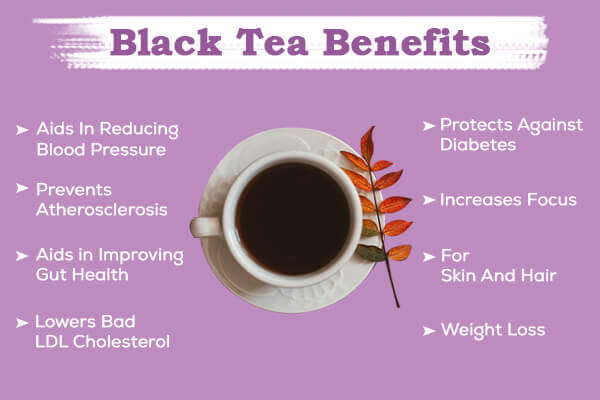The Benefits of Drinking Black Tea
Black tea, known for its robust flavor and dark color, has been enjoyed by millions of people around the world for centuries. In addition to being a delightful beverage, black tea offers a multitude of health benefits that make it a smart choice for those looking to improve their overall well-being. From boosting heart health to aiding digestion, black tea is packed with antioxidants and beneficial compounds that can positively impact our bodies. In this article, we will explore the various advantages of incorporating black tea into our daily routine and discover how this age-old drink can contribute to a healthier lifestyle.
Health Benefits
Black tea is not only a refreshing beverage, but it also offers a multitude of health benefits. One of the key advantages of black tea is its high antioxidant content. Antioxidants help fight against free radicals in the body, reducing oxidative stress and promoting overall health. These antioxidants, such as flavonoids and catechins found in black tea, have been linked to a reduced risk of chronic diseases, including certain types of cancer and cardiovascular diseases.
In addition to its antioxidant properties, black tea has been shown to boost heart health. Regular consumption of black tea has been associated with a lower risk of heart disease and a reduction in LDL cholesterol levels. The flavonoids found in black tea help improve the health of blood vessels and promote better blood circulation. This can contribute to a decreased risk of heart attacks and strokes.
Another notable health benefit of black tea is its positive impact on digestion. Black tea contains tannins, which have been shown to aid in the digestion process. These compounds can help relieve digestive discomfort and promote regular bowel movements. Moreover, black tea may also help in maintaining a healthy gut by enhancing the growth of beneficial bacteria in the intestines. This can result in improved overall digestion and a reduced risk of gastrointestinal disorders.
Black tea is also known for its immune-boosting properties. The antioxidants present in black tea can help strengthen the immune system and protect against various infectious diseases. These antioxidants aid in neutralizing harmful pathogens, reducing the likelihood of falling ill. Regular consumption of black tea can be particularly beneficial during flu seasons or when the immune system needs an extra boost.
When it comes to managing weight, black tea can also play a role. Due to its modest calorie content and richness in antioxidants, black tea can be a good addition to a weight management plan. It can help promote feelings of fullness and reduce cravings, which may contribute to more mindful eating habits. Additionally, black tea has been found to aid in fat oxidation, which can assist in weight loss efforts.
Mental Benefits
Black tea not only has positive effects on physical health but also provides several mental benefits. Drinking black tea can increase alertness and promote mental clarity. It contains a moderate amount of caffeine, which acts as a stimulant for the brain, helping to improve focus and concentration throughout the day. This can be particularly beneficial when tackling tasks that require cognitive function and mental acuity.
In addition to increased alertness, black tea is known for its calming properties. The amino acid L-theanine, naturally present in black tea, promotes relaxation and reduces stress and anxiety. This can help combat the pressures of daily life and provide a sense of calm. The combination of caffeine and L-theanine in black tea is believed to create a balance between focus and relaxation, making it an ideal choice for those seeking a mental boost without the jitters associated with other caffeinated beverages.
Furthermore, black tea has been shown to enhance mood and contribute to an overall sense of well-being. The compounds present in black tea, including polyphenols and amino acids, can positively affect neurotransmitters in the brain, such as dopamine and serotonin. These neurotransmitters are associated with feelings of happiness and contentment. Consuming black tea regularly may help improve mood and contribute to mental well-being.

Physical Benefits
Apart from its impact on overall health and mental function, black tea provides several physical benefits. Starting with energy levels, black tea can boost vitality and provide a natural source of energy. The combination of caffeine and other compounds found in black tea can help combat fatigue and increase alertness, allowing individuals to stay more energized throughout the day.
Black tea also contributes to better oral health. Studies have shown that black tea can help reduce the risk of cavities by inhibiting the growth of harmful bacteria in the mouth. The polyphenols found in black tea can prevent the formation of plaque and dental caries. Regular consumption of black tea, along with good oral hygiene practices, can lead to healthier teeth and gums.
Moreover, the long-term consumption of black tea can strengthen bones. The flavonoids present in black tea have been shown to positively affect bone health, reducing the risk of osteoporosis and fractures. These compounds help improve bone density and promote the absorption of calcium, essential for maintaining strong and healthy bones.
When it comes to skin health, black tea has shown promising benefits. The antioxidants present in black tea can help protect the skin against free radicals, reducing the signs of aging and promoting a more youthful complexion. Additionally, black tea can soothe and hydrate the skin, leaving it feeling refreshed and rejuvenated.
In terms of hair health, black tea has been found to promote hair growth and improve scalp conditions. The caffeine present in black tea stimulates hair follicles and may help increase hair growth. It can also improve scalp health by reducing inflammation and minimizing dandruff. Regular rinsing of the hair with black tea can result in stronger, shinier, and healthier-looking hair.
Disease Prevention
Regular consumption of black tea can contribute to disease prevention and reduce the risk of various health conditions. The abundance of antioxidants and beneficial compounds in black tea makes it a valuable addition to a healthy lifestyle.
Firstly, black tea has been associated with a lower risk of certain types of cancer. The polyphenols found in black tea have been shown to possess anti-cancer properties, inhibiting the growth and spread of cancer cells. The antioxidants in black tea can also neutralize free radicals that may contribute to the development of cancer. Regular consumption of black tea, along with a balanced diet and lifestyle, can be a beneficial factor in reducing the risk of cancer.
Secondly, black tea has been found to reduce the risk of diabetes. The polyphenols present in black tea can help regulate blood sugar levels and improve insulin sensitivity. This can be particularly beneficial for individuals at risk of developing type 2 diabetes or those with blood sugar control issues. Adding black tea to a healthy diet and exercise regimen can contribute to better glycemic control and reduce the risk of diabetes.
Furthermore, the consumption of black tea has been linked to a reduced risk of cardiovascular diseases. The antioxidants in black tea can help lower LDL cholesterol levels, reducing the risk of heart disease. Additionally, black tea has shown potential in reducing blood pressure, a significant risk factor for cardiovascular diseases. Regularly including black tea in a heart-healthy diet can promote better cardiovascular health and decrease the likelihood of developing heart-related conditions.
Lastly, black tea has been found to decrease the risk of stroke. The flavonoids in black tea can contribute to better blood vessel health and reduce the risk of blood clot formation. This can help prevent strokes caused by a blockage in a blood vessel. By promoting healthy blood flow and reducing the likelihood of clot formation, black tea can be a valuable component of a stroke prevention strategy.

Hydration
One of the simplest and most enjoyable ways to stay adequately hydrated is by consuming black tea. Alongside its numerous health benefits, black tea provides a source of hydration that can contribute to overall well-being.
The primary purpose of fluid intake is to maintain hydration in the body. Black tea can be an effective way to provide adequate fluid intake, contributing to hydration levels. While water is the most straightforward choice for hydration, the flavor and aroma of black tea can make it a more appealing option. Enjoying a cup of black tea throughout the day can be an effective strategy to ensure hydration, especially for those who struggle to consume sufficient amounts of plain water.
Additionally, black tea can quench thirst and provide a refreshing sensation. The mild bitterness and tannins present in black tea can satisfy thirst and offer a flavorful alternative to plain water. This can make black tea an enticing option for individuals who may find it challenging to drink large quantities of water or are looking for different beverage choices to stay hydrated.
Digestive Benefits
Black tea can provide notable benefits for digestive health and aid in relieving common digestive issues. The compounds found in black tea can support a healthy gut and help alleviate constipation.
Firstly, black tea promotes gut health by enhancing beneficial bacteria in the intestines. The polyphenols and other compounds in black tea act as prebiotics, fueling the growth of good bacteria in the gut. By nourishing these beneficial microbes, black tea can help maintain a healthy balance of gut flora, contributing to improved overall digestion.
Furthermore, black tea can help relieve constipation. The tannins found in black tea have been shown to possess mild laxative effects, promoting regular bowel movements. By stimulating the muscles in the intestines and softening stool, black tea can provide relief from constipation. Incorporating black tea into a balanced diet and ensuring adequate fiber intake can help promote healthy digestion and prevent constipation.

Boosts Metabolism
Black tea has been found to boost metabolism, making it a helpful addition to weight loss and weight management strategies. The combination of compounds found in black tea can aid in accelerating metabolism and enhancing fat oxidation.
Firstly, black tea can aid in weight loss by increasing fat oxidation. The polyphenols in black tea have been shown to stimulate the breakdown of fat cells, promoting fat burning and contributing to weight loss. By enhancing fat oxidation, black tea can be a valuable element in a calorie-controlled diet and exercise plan.
Additionally, black tea can help in weight management by aiding in appetite control. Regular consumption of black tea has been associated with increased feelings of fullness and reduced cravings. The antioxidants in black tea can provide a sense of satiety, helping individuals maintain a healthy caloric intake and avoid overeating.
By boosting metabolism and assisting in appetite control, incorporating black tea into a well-rounded weight management plan can support individuals in achieving their weight loss goals.
Improves Cardiovascular Health
Black tea has a positive impact on cardiovascular health, contributing to lower cholesterol levels and reduced blood pressure. These effects can significantly lower the risk of heart disease and improve overall cardiovascular well-being.
Firstly, regular consumption of black tea has been linked to lower cholesterol levels. The polyphenols in black tea can help reduce LDL cholesterol, also known as “bad” cholesterol, which is a significant risk factor for heart disease. By decreasing LDL cholesterol and promoting a healthy cholesterol profile, black tea can contribute to maintaining better cardiovascular health.
Furthermore, black tea has been found to help reduce blood pressure. The flavonoids present in black tea can help relax blood vessels and improve blood flow, leading to lower blood pressure levels. By lowering blood pressure, black tea can reduce the strain on the heart and arteries, decreasing the risk of cardiovascular diseases such as strokes and heart attacks.
By incorporating black tea into a well-balanced diet and lifestyle, individuals can take proactive steps towards improving their cardiovascular health and reducing the risk of heart-related conditions.

Enhances Cognitive Function
Black tea has been shown to have positive effects on cognitive function, improving memory, focus, and reducing the risk of age-related cognitive decline, such as Alzheimer’s disease.
Firstly, black tea can help prevent age-related cognitive decline. The antioxidants present in black tea, such as flavonoids, have been shown to protect brain cells from damage caused by free radicals. This can help preserve cognitive function and reduce the risk of neurodegenerative diseases, such as Alzheimer’s disease.
Moreover, regular consumption of black tea has been associated with improved memory and focus. The combination of caffeine and L-theanine found in black tea can enhance cognitive performance, leading to improved attention and mental alertness. These effects can be particularly beneficial when studying, working on complex tasks, or engaging in activities that require concentration.
By including black tea as a part of a well-rounded diet and lifestyle, individuals can potentially enhance their cognitive function and promote long-term brain health.
Promotes Oral Health
Black tea provides several oral health benefits, contributing to healthier teeth and gums. Regular consumption of black tea can reduce the risk of cavities and inhibit the growth of harmful bacteria in the mouth.
Firstly, black tea has been found to reduce the risk of cavities. The polyphenols present in black tea can inhibit the growth of bacteria that cause dental caries. These compounds can help prevent the formation of plaque and protect tooth enamel, reducing the likelihood of cavities. Incorporating black tea into oral hygiene routines, alongside proper dental care, can contribute to improved oral health.
Furthermore, the antimicrobial properties of black tea can inhibit the growth of harmful bacteria in the mouth. The catechins and tannins found in black tea can help fight against oral bacteria, reducing the risk of gum disease and other oral infections. Regular consumption of black tea can promote a healthier oral microbiome and contribute to better overall oral health.
By enjoying a cup of black tea as part of a balanced diet and maintaining good oral hygiene practices, individuals can take steps towards improving their oral health and preventing oral diseases.


